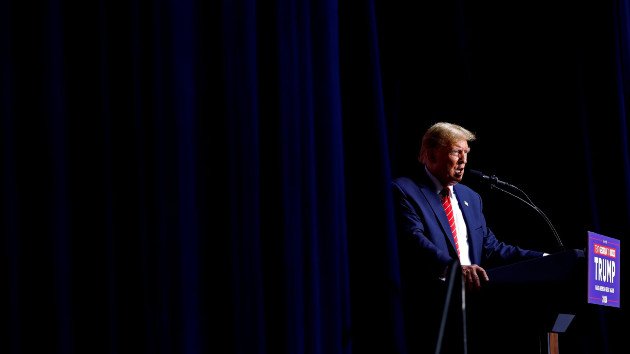(WASHINGTON) — Special counsel Jack Smith, responding on Tuesday to the judge overseeing former President Donald Trump’s classified documents case, urged her to reverse course on entertaining the idea that Trump had any personal ownership over the classified materials he has been charged with unlawfully possessing.
In a late-night filing replying to an order last month from Judge Aileen Cannon requesting proposed jury instructions that appeared to accept at face value what legal experts have argued is one of Trump’s most fringe defenses — that the former president had unchecked ability to claim all classified records as his personal property — Smith argued that accepting such an argument would not only be “pure fiction,” but “meritless and fatally undermined” by all the evidence gathered by the government as part of their case.
Among that evidence, according to Smith, are interviews with Trump’s own Presidential Records Act representatives and “numerous” high-ranking officials from the White House, none of which “had heard Trump say that he was designating records as personal,”
“To the contrary, every witness who was asked this question had never heard such a thing,” Smith’s office said.
Smith’s office repeatedly urged Cannon that if she continued to entertain such an interpretation of the Presidential Records Act, she “must inform the parties of that decision well in advance of trial” — suggesting they’d seek relief from the 11th Circuit Court of Appeals, which has already overturned her rulings twice in the case.
“The Government must have the opportunity to consider appellate review well before jeopardy attaches,” the filing said.
Trump last year pleaded not guilty to all charges related to his handling of classified materials after leaving the White House, after prosecutors said he repeatedly refused to return hundreds of documents containing classified information ranging from U.S. nuclear secrets to the nation’s defense capabilities, and took steps to thwart the government’s efforts to get the documents back. The former president has denounced the probe as a political witch hunt.
In their filing, the special counsel’s office cited the 11th Circuit’s previous opinion that they argued should make clear to Cannon that Trump had no personal interest over the documents seized in the FBI’s 2022 search of Trump’s Mar-a-Lago estate.
“Plaintiff does not have a possessory interest in the documents at issue, so he does not suffer a cognizable harm if the United States reviews documents he neither owns nor has a personal interest in,” the filing said.
As part of the filing, Smith’s office also revealed a series of communications between Trump’s team and the president of the conservative group Judicial Watch, Tom Fitton, which they argued showed his acknowledgment as early as February of 2022 that “the classified records at issue in this case were presidential rather than personal.”
According to the filing, even as Fitton was advising an unnamed Trump employee that the records Trump possessed at Mar-a-Lago “should have been characterized as personal,” another employee urged Trump to reject such an argument and explained to him why.
“Nevertheless, on February 10, 2022, Trump released a statement claiming in part, “I have been told I was under no obligation to give the material based on various legal rulings that have been made over the years,” the filing said. “Before this time, the second employee had never heard this theory from Trump. No other witness recalled Trump espousing this theory until after the Judicial Watch president conveyed it to him in February 2022.”
Later in their filing, the special counsel includes drafts of what they argue would amount to “incorrect” jury instructions that present hypotheticals of what Judge Cannon’s order would permit former presidents to do:
Among the examples:
“I instruct you, however, that, as to a former President, even if he lacks a security clearance, lacks a need to know classified information, and stores information outside of a secure facility, he is authorized to do so if the classified information is contained within a ‘personal record,’ as that term is defined by the Presidential Records Act (PRA), a statute that establishes the public ownership of presidential records and ensures the preservation of presidential records for public access after the termination of a President’s term in office.”
“I further instruct you that a President has unreviewable authority to designate any record whatsoever as personal, regardless of whether it meets the statutory definitions I have just provided. I further instruct you that, if, before the end of his term in office, a President transfers records from the White House to any location other than the National Archives and Records Administration, as alleged in the Superseding Indictment, he has necessarily exercised his unreviewable authority to designate those records as personal and, as a matter of law, he is authorized to possess them and you may not find him guilty.”
In their own filing responding to Judge Cannon’s order, Trump’s team put forward a variety of hypothetical jury instructions that would essentially guarantee Trump an immediate jury acquittal.
Among them:
“As President of the United States, President Trump was what is called an ‘original classification authority’ based on his power under the Constitution and related laws, which means that it was his authority that was used, by himself and others that he delegated it to, to classify information … As President of the United States, President Trump also had absolute and unreviewable authority to declassify documents and information … You heard evidence during the trial that President Trump exercised that authority, at times verbally and at times without using formal procedures, while he was President. I instruct you that those declassification decisions are examples of valid and legally appropriate uses of President Trump’s declassification authority while he was President of the United States.”
Trump’s classified documents trial is currently scheduled to get underway on May 20, but Judge Cannon is expected to delay that date following recent arguments from both sides.
Copyright © 2024, ABC Audio. All rights reserved.












